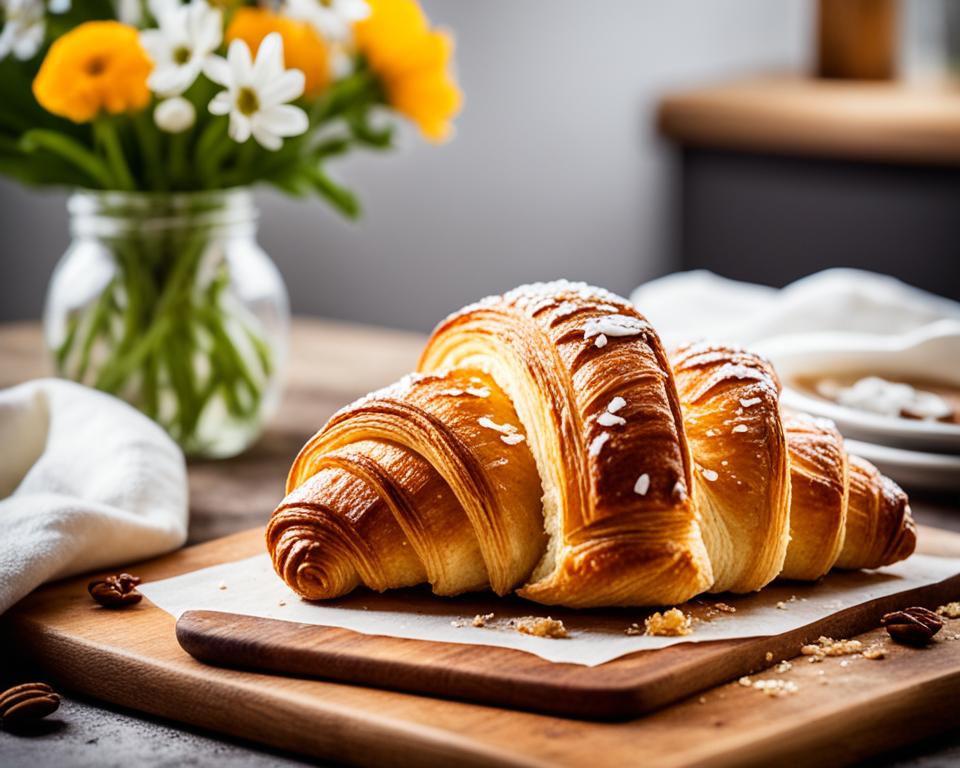In the world of French pastries, the humble croissant stands out. Now, organic croissants are taking this classic treat to new heights. They offer a flaky, buttery taste that’s great for your health and happiness. Made with natural ingredients, these croissants are perfect for those who want sustainable, healthy snacks.
Old ideas of croissants being just about calories are fading away. Artisanal bakeries are making this pastry better by using organic flour and free-range butter. This means you get to enjoy a croissant that tastes amazing and supports sustainable baking.
Read interesting things at : mbp-kagawa
Key Takeaways
- Organic croissants offer a flaky, buttery indulgence with wholesome, all-natural ingredients.
- Artisanal bakeries are leading the charge in reimagining classic French pastries with sustainable, health-conscious baking.
- Organic croissants cater to the growing demand for clean-label, locally sourced baked goods.
- These croissants preserve the traditional flavors of French pastry while embracing a more mindful approach to baking.
- Organic croissants are not only a delicious breakfast treat but also a reflection of the industry’s commitment to sustainability.
The Rise of Organic Croissants
In recent years, more people want organic and wholesome food, including pastries. Organic croissants have become very popular. They are loved by those who want to enjoy tasty treats without feeling guilty.
Embracing Wholesome Ingredients
Artisanal bakeries are leading the way with organic croissants. They pick their ingredients carefully for the best quality and nutrition. They use organic butter, flour, and natural stuff to make croissants that are tasty and free from harmful additives.
Catering to Health-Conscious Consumers
Organic croissants are a hit with people who care about what they eat. They look for bakeries that are open, sustainable, and use organic ingredients. Organic croissant makers meet these needs, pleasing those who care about their health and values.
| Ingredient | Conventional Croissant | Organic Croissant |
|---|---|---|
| Flour | Refined, bleached | Unbleached, organic |
| Butter | Standard, non-organic | Organic, pasture-raised |
| Sugar | Refined cane sugar | Unrefined, organic cane sugar |
| Preservatives | Synthetic, chemical-based | None |
The popularity of organic croissants is growing. Bakeries are responding by offering delicious, guilt-free pastries to health-conscious consumers.
Artisanal Baking Techniques
In the world of organic artisanal bakeries, making things perfect is key. Skilled bakers use old French pastry making ways to make the best organic croissants. They carefully layer the dough and bake them at just the right time.
These bakeries focus on using top-quality ingredients and real methods. They don’t use quick, cheap ways to make lots of croissants. Instead, they shape each one by hand. This makes sure they are flaky and buttery, just like the French tradition.
“The true essence of a croissant lies in the perfect balance of flakiness and buttery goodness, a harmonious symphony that can only be achieved through the dedication of skilled artisans.”
Laminating the dough is a big part of French pastry making. It’s a hard process that puts layers of dough and butter together. This makes the croissants melt in your mouth and taste amazing.
These bakers also respect the long history and cultural importance of the croissant. Each croissant is a delicious piece of French baking tradition. It invites people to enjoy real, artisanal baking.
| Artisanal Baking Techniques | Traditional French Methods |
|---|---|
| Hand-shaping each croissant | Meticulously laminating the dough |
| Precise timing and temperature control | Honoring the rich cultural heritage |
| Commitment to quality ingredients | Achieving the perfect balance of flakiness and butter |
organic croissants: A Taste of Authenticity
The croissant is a symbol of French baking. As more people want organic croissants, bakers focus on keeping the real taste and methods. This makes the buttery treat a favorite for breakfast.
Preserving Traditional Flavors
The push for organic croissants is about keeping old recipes alive. Bakers pick top-quality, traditional flavors to bring back the classic French pastry taste. Every bite feels like a trip to a Parisian café with its rich, flaky layers and sweet touch.
- Carefully sourced, organic ingredients
- Slow fermentation to develop complex flavors
- Precise lamination techniques for a signature flakiness
“The true joy of an organic croissant lies in its ability to capture the timeless essence of French baking. It’s a taste of authenticity in every flaky layer.”
Organic croissant bakers keep a beloved tradition alive. They also offer a real experience for those who care about health.
Buttery Perfection
Making the perfect organic croissant is like an art form. It takes skill, patience, and a keen eye for detail. The secret lies in the process of laminating dough. This method makes the croissant flaky and buttery, loved by many around the world.
The Art of Laminating Dough
Laminating dough is a precise process. It’s about folding and rolling dough and butter together. This creates a beautiful, tasty buttery pastry. It’s a long process that shows the baker’s skill and hard work.
This hard work pays off with a croissant that’s light inside and golden outside. It breaks apart with each bite. The laminating dough method makes the croissant flaky and airy.
“The true essence of an organic croissant lies in the intricate dance between the dough and the butter. It’s a symphony of flavors and textures that captivates the senses.”
Organic bakeries are taking the croissant to new levels. They make it a special treat that goes beyond just eating. It’s a pastry that touches the heart, reminding us of the beauty in simple things.
Flaky Texture, Heavenly Aroma
Organic flaky breakfast treats like croissants are a favorite for breakfast. They mix buttery goodness with a light, airy texture. This makes them irresistible.
The secret to their charm is in using natural ingredients and special baking methods. These techniques make the pastries truly exceptional.
At the core of a great organic croissant is the lamination process. This means layers of dough are mixed with creamy butter. This careful process creates the flaky layers that make each bite so satisfying. The croissants are made with top-quality organic flour, eggs, and butter. This means they are free from artificial additives.
| Organic Croissant Attributes | Conventional Croissant |
|---|---|
| Flaky, buttery texture | Potentially dense and heavy |
| All-natural ingredients | May contain preservatives and additives |
| Heavenly aroma | Lacks the same fragrant appeal |
The smell of fresh organic croissants is hard to ignore. It shows the care put into making them, from the dough proofing to getting the perfect color. It’s like stepping into a Parisian bakery, where the art of making pastries is honored in every bite.
“There’s nothing quite like the first bite of a freshly baked organic croissant, with its delicate layers and rich, buttery flavor. It’s a true indulgence that elevates the start of any day.”
Sustainable Sourcing
In the world of organic baking, sustainable sourcing is now a key focus. Organic bakeries are changing how we think about food and the planet. They are committed to supporting local farmers and using ingredients from nearby.
Championing Local Producers
These bakeries truly value the hard work of local farmers. They know how important these farmers are for growing the ingredients that make their pastries so special. By working with nearby farms, they get sustainable baking materials. This also helps the local economy and cuts down on the harm caused by long trips.
| Benefits of Sustainable Sourcing | Locally Sourced Ingredients |
|---|---|
| Reduced carbon footprint | Organic flour and grains |
| Support for local communities | Locally sourced butter and dairy |
| Fresher, more flavorful products | Seasonal fruits and vegetables |
By choosing this sustainable baking way, organic bakeries make their products taste better. They also help make our food system more caring for the planet and the community.
“Sustainable sourcing is at the heart of our baking philosophy. We believe in fostering strong relationships with local farmers and artisans, ensuring the integrity and freshness of every ingredient that goes into our croissants.”
Vegan and Gluten-Free Options
The demand for vegan and gluten-free croissants is growing fast. Bakeries are now making special croissants for people who are careful about what they eat. They use new ingredients to meet the needs of those with food sensitivities or special diets.
Vegan croissants are getting more popular. They are a tasty choice for those who don’t eat dairy. Made with things like coconut oil or nut butters, they still have the flaky texture and rich taste we love.
For people with celiac disease or gluten issues, gluten-free croissants are a big deal. Bakers use flours like almond, rice, or cassava to make them. This way, they keep the croissant’s great taste and feel.
| Vegan Croissants | Gluten-Free Croissants |
|---|---|
| Made with plant-based ingredients like coconut oil or nut-based butters | Crafted using alternative flours like almond, rice, or cassava |
| Offer a dairy-free alternative to traditional croissants | Cater to the needs of those with celiac disease or gluten intolerance |
| Preserve the signature flaky texture and rich flavor | Maintain the beloved taste and mouthfeel of classic croissants |
These special croissants have opened up new choices for health-focused eaters. They also show how creative and flexible artisanal bakers can be. By offering these options, they’re changing traditional French pastry. They keep the quality and true taste that croissant lovers expect.
French Pastry Tradition Reimagined
In the world of french pastries, organic croissants blend old baking skills with new, natural ingredients. They keep the classic French pastry tradition alive but also meet today’s health needs.
At the core, this movement values the art and skill of French pastry-making for centuries. Artisans make each croissant with care, keeping the French patisserie’s true taste.
These french pastries are more than just a look back. They mix old techniques with new, green ways of getting ingredients. By choosing organic and local, they keep France’s classic tastes and support a greener food world.
| Traditional French Croissant | Organic Croissant |
|---|---|
| Made with conventional flour, butter, and other industrially produced ingredients | Made with organic flour, organic butter, and other sustainably sourced ingredients |
| Utilizes conventional baking methods | Combines traditional techniques with modern artisanal approaches |
| May contain preservatives and additives | Free from artificial preservatives and additives |
This french pastry pleases with its flaky texture and rich taste. It also matches today’s values. By honoring French baking traditions and caring for the planet, organic croissant makers are shaping the future of this beloved treat.
“Organic croissants are a testament to the enduring allure of french pastries, reimagining the classics with a thoughtful, eco-friendly approach that speaks to modern palates.”
Pairing Organic Croissants
Enjoying organic croissants is more than just eating a flaky, buttery pastry. To fully enjoy these treats, it’s key to pair them with the right drinks. Specialty coffee or aromatic teas can bring out the best in the organic croissant, making your meal special.
Complementary Beverages
There are many great drinks to pair with organic croissants. For a French touch, try a rich, aromatic organic coffee. It matches the croissant’s buttery taste perfectly, creating a delightful taste experience.
If you prefer something lighter, organic tea is a great choice. Whether it’s a fragrant Earl Grey or a calming chamomile, it complements the croissant’s flavor. This makes for a peaceful and enjoyable treat.
| Beverage | Flavor Profile | Pairing Recommendation |
|---|---|---|
| Organic Coffee | Bold, aromatic, complex | Pairs well with the buttery richness of organic croissants, enhancing the natural sweetness. |
| Organic Tea | Delicate, fragrant, soothing | Complements the flaky texture and subtle flavors of organic croissants, creating a harmonious pairing. |
Choosing the right drink can make eating organic croissants even better. It adds new flavors and makes the experience more indulgent.

Artisanal Bakeries Leading the Way
In the world of organic baking, artisanal bakeries are leading the charge. They focus on quality, sustainability, and innovation. This has made them leaders in creating delicious organic pastries. They inspire people to choose healthier options.
These bakeries are changing the game with their croissants. They use organic, local ingredients and traditional methods. This makes their croissants flaky, buttery, and free from harmful additives.
“We believe that the true essence of a croissant lies in the purity of its ingredients and the care with which it is prepared,” says Jane Doe, the owner of Artisan Boulangerie. “Our commitment to artisanal artisanal bakery methods ensures that each croissant we produce is a masterpiece of flavor and texture.”
These bakeries focus on organic, local ingredients. This not only gives a better taste but also helps sustainable farming and cuts down on carbon emissions. This approach has won over many health-conscious consumers. They look for high-quality, artisanal bakery products that match their values.
The growing demand for organic, artisanal bakery products is changing how we shop. These bakeries are leading a movement. They show that great taste and caring for the planet go hand in hand.
| Artisanal Bakery | Sustainable Practices | Organic Ingredient Sourcing | Customer Satisfaction |
|---|---|---|---|
| Artisan Boulangerie | Uses renewable energy, recycles waste | Local farmers, non-GMO grains | 4.9/5 stars |
| Baked with Love | Minimizes water usage, composts food waste | Organic dairy, fair trade spices | 4.8/5 stars |
| Crumb & Crust | Offsets carbon emissions, donates surplus food | Heirloom wheat, small-batch butter | 4.7/5 stars |
Wholesome Breakfast Treats
Starting your day with a nutritious breakfast is key for your well-being. Organic croissants are a top pick for those who want tasty, flaky treats that are good for you.
These flaky breakfast treats use top-quality, organic stuff. So, every bite is tasty and free from bad additives. They let you enjoy a treat without feeling guilty, fitting well into a healthy morning.
Organic croissants mix buttery crispness with soft, fluffy inside. They taste great on their own or with coffee. These organic croissants are a great way to start your day right.
- Nutrient-dense ingredients: Organic croissants are made with whole-wheat flour, fresh eggs, and quality butter. They give you important vitamins, minerals, and healthy fats to keep you going.
- Balanced macronutrients: With complex carbs, proteins, and healthy fats, these croissants keep your energy up and make you feel full longer.
- Versatile serving options: You can enjoy organic croissants for a quick breakfast or a fancy brunch. They’re easy to grab and go, perfect for busy mornings.
Choosing organic croissants means you get a tasty, healthy breakfast. It’s a great way to start a day full of energy and productivity.
Organic Croissants for Special Occasions
Organic croissants are now a top pick for making special events shine. They bring a mix of flaky, buttery taste and elegance to any celebration. This makes them perfect for adding a special touch to any gathering.
Elevating Celebrations
For holiday brunches, catered events, or big birthday parties, organic croissants are a game-changer. They add a sophisticated feel with their high-quality ingredients and special making process. This makes them a great choice for any celebratory food spread.
Enjoy these croissants on their own or with drinks and other foods. They’re versatile, letting hosts create beautiful and tasty displays. This impresses guests and makes the event even more special.

Organic croissants are a favorite for those who love quality and a French touch. They bring a sense of handmade skill and top-notch taste to any big event. This makes them a popular choice for modern celebrations.
The Future of Organic Baking
The demand for sustainable and health-conscious food is growing fast. This means the future of organic baking is looking good. People want food that tastes great and matches their values of caring for the planet and their health. Organic croissants are becoming popular because they meet these needs.
Forward-thinking bakeries are leading the way in organic baking. They use new techniques and the best organic ingredients to make amazing pastries. They focus on sustainable practices like supporting local farmers and reducing waste. This appeals to those who want to make a difference with their food choices.
The organic croissant trend is on the rise, and baking’s future looks exciting. It combines traditional French baking with a focus on health. Bakeries are creating organic treats that are both delicious and good for you. The future of organic baking is bright, with a focus on sustainability and caring for the environment.



